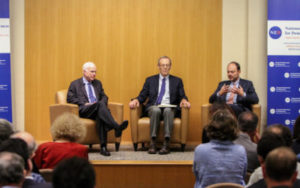Imprisoned Russian opposition figure and vocal Kremlin critic Vladimir Kara-Murza has been awarded the 2022 Václav Havel Human Rights Prize, say reports:
Awarded every year by the Parliamentary Assembly of the Council of Europe (PACE), the Václav Havel Library and the Charter 77 Foundation, the prestigious award honors civil society figures for their fight for the protection of democracy and fundamental human rights. The €60,000-prize was presented on Monday in Strasbourg during the opening day of the PACE’s autumn plenary session.

Vladimir Kara Murza (right) with former NED President Carl Gershman (center) and Senator John McCain
“The current Russian authorities — without intending to do so — have painted the portrait of a true patriot. Vladimir Putin’s government sees such people as traitors,” Kara-Murza’s wife Yevgeniya said (above) as she received the award on his behalf.
“Despite the risks, Vladimir Kara-Murza had the courage to return to his country to continue his fight, even while having the possibility to stay safe,” said PACE president Tiny Kox. “It takes incredible courage in today’s Russia to stand against the power in place. Today, Mr Kara-Murza is showing this courage, from his prison cell.”
Kara-Murza co-founded the Russian Anti-War Committee to oppose Russian President Vladimir Putin’s invasion of Ukraine. He was arrested in April and is being held in pre-trial detention after speaking out against the war.
Last week, a high treason charge was added to the charges he faces over his alleged cooperation with organizations in a NATO member for many years, RFE/RL adds. If convicted on the charge, the staunch opponent of the Kremlin faces up to 20 years in prison.
The prize has also been awarded to Belarusian opposition leader Maria Kalesnikava (2021), Saudi women’s rights activist Loujain Alhathloul (2020), jointly to Ilham Tohti and the Youth Initiative for Human Rights (2019), Oyub Titiev (2018), Murat Arslan (2017), Nadia Murad (2016), Ludmilla Alexeeva (2015), Anar Mammadli (2014) and Ales Bialiatski (2013).
Russian dissident @vkaramurza wins Vaclav Havel Human Rights Prize https://t.co/MBQdf29GuG
— Democracy Digest (@demdigest) October 10, 2022







